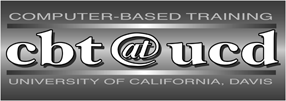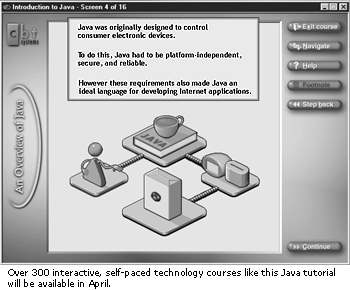

cbt at ucd
An Alternative to Classroom Technology Training
by Aviva Luria and Babette SchmittIn April, thanks to a comprehensive site license agreement between the University of California and CBT (Computer Based Training) Systems, all members of the UC Davis community will have a great new resource for self-paced technology instruction: cbt at ucd.
CBT Systems is a leading provider of interactive educational software for information technology professionals. As technology becomes more complex and more pervasive, institutions of higher education are starting to offer computer-based courses as an alternative to classroom-based training.
Keeping Pace With Technology
cbt at ucd will offer access to more than 300 different courses, on topics ranging from Netscape to Java programming, from Inter-net concepts to Oracle. The courses feature several certification series, including titles that, taken together, offer preparation for Microsoft tests. (CBT Systems works with leading software companies, such as Microsoft, Netscape, Novell, Oracle, Cisco, and the IBM-Netscape-Sun Microsystems Java Consortium to develop vendor-specific training.)cbt at ucd offers something for nearly everyone, from experienced programmers to computer novices and makes possible a wider range of course offerings, says Katie Stevens, cbt at ucd project manager. "Some topics, because of their depth or technical nature, require a great deal of time or resources to be taught. The value of CBT lies in its offering of many hours of instruction on technical topics. Thanks to the site license agreement between UC and CBT Systems, UC Davis will be able to offer a wider range of technical training opportunities to the entire campus community." The three-year contract for the courseware, signed in October, allows each campus to purchase additional or different courses.
Integrating CBT Into Staff Technology Offerings
Staff Development & Professional Services (SD&PS) is exploring several approaches for integrating CBT courses into the regular technology course curriculum offered to UC Davis staff. "Computer-based training has its place in the vast array of instructional delivery methodologies available to adult learners on this campus, and we encourage staff to explore the online CBT courses as a learning option," say Michele Platten and Carina Celesia Moore, co-managers of SD&PS. In partnership with IT Training, SD&PS will be developing a conceptual framework for staff, supervisors and managers regarding technology learning options.The shift from instructor-led technology classes to computer-based training takes careful education. "Through CBT, staff members can enhance their computer skills without leaving their workstations -- but remember, the dialog between the individual staff member and the supervisor is essential in determining a plan for professional development," say Platten and Moore. Traditionally, supervisors have been asked to support staff release time to attend courses or programs that are held away from work. With CBT courses, staff members no longer need to leave their workstations, but they will still need support to dedicate uninterrupted time to CBT.
"The rate of change and complexity that we experience on a daily basis increases the risk that CBT may become lost in the continuous shifting and reprioritizing of work. That is why it is essential that the decision to engage in CBT be made in partnership between a supervisor and a staff member," say Platten and Moore. The courses are scheduled to appear in the Staff Development & Professional Services 1998-99 catalog.

Control Your Own Learning Experience
Like other self-paced learning tools, CBT courses will be particularly appealing to self-disciplined and motivated learners. To help you determine the level of difficulty of each course, course overviews listing prerequisites, learning objectives, topic headings, and the specific target audience are posted on the Web. You can also take pre-tests to determine whether you already know the material. The courses, which feature rich graphics, are structured as units, each of which takes roughly one hour to complete. You can tailor your learning experience to your particular needs and control the pace and sequence of instruction. Advice is provided at critical junctures to help you make appropriate training path decisions. To gauge your learning progress, you will be continually assessed and given feedback, both during and after instruction.You may choose one of three CBT access options:
- "Live play" lets you interact directly with the Web server. This option requires an uninterrupted connection to the campus network.
- Download a course to your computer or laptop hard drive before you leave campus. Courses average 15 megabytes, and can take a long time to download with a modem connection. (Some courses are available only for download, as live play is a relatively new feature of CBT Systems products.)
- Seven CDs, grouped by software packages, will be available for purchase at the campus bookstore.
Pilot Participants Provide Valuable Feedback
Two month-long pilots were conducted from December to March to help the cbt at ucd project team work out technical kinks and determine the level of support needed. Both pilot programs sought to test the delivery of the courses and to uncover any obstacles to learning. Participants were asked to make "diary" entries detailing their experiences. These comments will help the project team prepare for the gradual roll-out of cbt at ucd to the entire campus community. Carol Beck, computer specialist for Sproul Social Sciences Administration and a Technology Support Coordinator (TSC) for her department, participated in the CBT tutorial on Java. Lab time was set aside for participants to work independently and ask questions of an instructor. "It worked really well. Because it wasn't taught in a classroom, it gave me the flexibility I needed. I did sometimes need the lab time to get away from the office for some peace and quiet, but I was still working at my own pace in the lab," she said.Roseanne Serrao of the Institute of Transportation Studies took 16 courses as part of the first pilot. She likes the visual nature of CBT Systems courses, and said that "they constantly reinforce what you were just taught with questions and diagrams."
"I believe the retention level is far greater than that of a classroom-taught course," she said. "You can find the designated topics, rather than waiting for an instructor to cover what you want to hear."
Finding a Mac Solution
The tutorials are available for use in Windows 95 and Windows NT environments. CBT Systems plans to have courses for the Macintosh platform sometime in 1999. In the meantime, the cbt at ucd project team is considering solutions like those being used for Banner."We want to do our best to add what Mac users need and ensure there's a solution for them. But what we're faced with is that the CBT courses as they've come to us don't have a Mac platform," Stevens said.
CBT courses will be available to all UCD affiliates in April. More information can be found on the Web.
The cbt at ucd team contributed to this article.
Resources:
- cbt at ucd Web site:
- http://cbt.ucdavis.edu/cbthelp
- CBT Systems Web site:
- http://www.cbtsys.com
- Email: cbt@ucdavis.edu (for questions on technical issues and course content).
- The 1997-98 Staff Development & Professional Services catalog is available at http://sdps.ucdavis.edu/